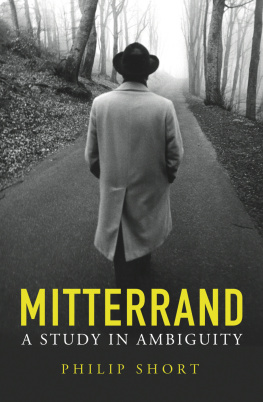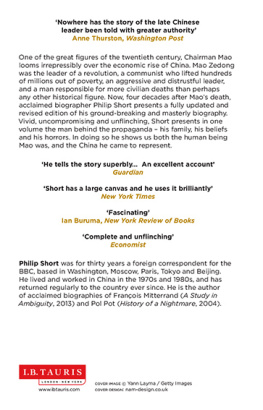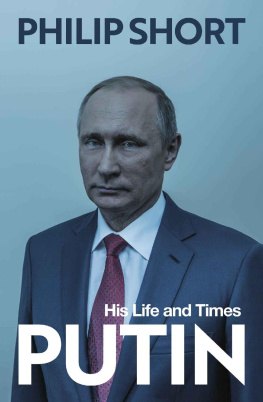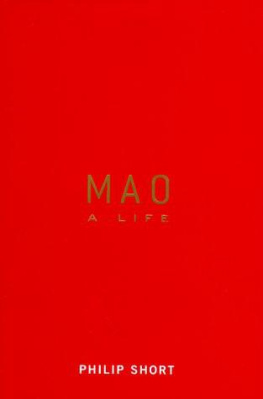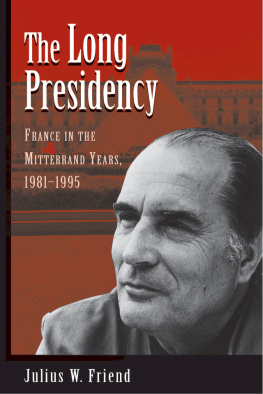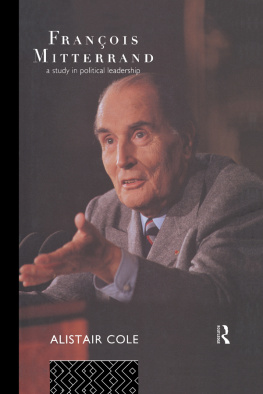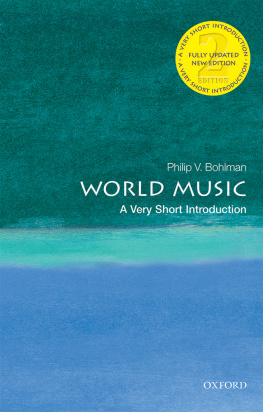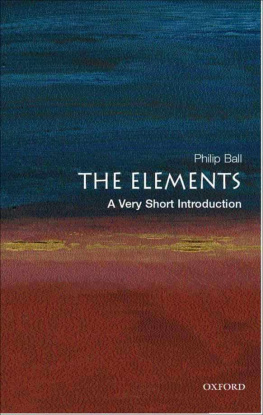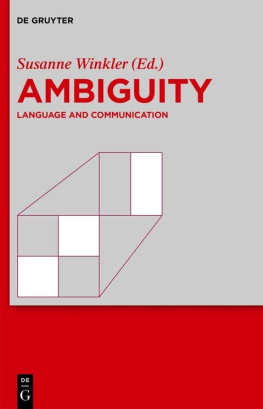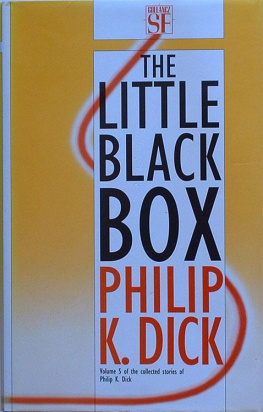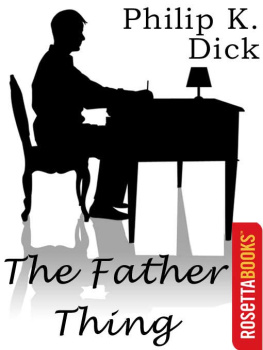Philip Short - Mitterrand: A Study in Ambiguity
Here you can read online Philip Short - Mitterrand: A Study in Ambiguity full text of the book (entire story) in english for free. Download pdf and epub, get meaning, cover and reviews about this ebook. year: 2013, publisher: Bodley Head, genre: Detective and thriller. Description of the work, (preface) as well as reviews are available. Best literature library LitArk.com created for fans of good reading and offers a wide selection of genres:
Romance novel
Science fiction
Adventure
Detective
Science
History
Home and family
Prose
Art
Politics
Computer
Non-fiction
Religion
Business
Children
Humor
Choose a favorite category and find really read worthwhile books. Enjoy immersion in the world of imagination, feel the emotions of the characters or learn something new for yourself, make an fascinating discovery.
- Book:Mitterrand: A Study in Ambiguity
- Author:
- Publisher:Bodley Head
- Genre:
- Year:2013
- Rating:4 / 5
- Favourites:Add to favourites
- Your mark:
- 80
- 1
- 2
- 3
- 4
- 5
Mitterrand: A Study in Ambiguity: summary, description and annotation
We offer to read an annotation, description, summary or preface (depends on what the author of the book "Mitterrand: A Study in Ambiguity" wrote himself). If you haven't found the necessary information about the book — write in the comments, we will try to find it.
Mitterrand: A Study in Ambiguity — read online for free the complete book (whole text) full work
Below is the text of the book, divided by pages. System saving the place of the last page read, allows you to conveniently read the book "Mitterrand: A Study in Ambiguity" online for free, without having to search again every time where you left off. Put a bookmark, and you can go to the page where you finished reading at any time.
Font size:
Interval:
Bookmark:
Contents
Aesthete, sensualist, bookworm, politician of Machiavellian cunning:
Franois Mitterrand was a man of exceptional gifts and exceptional flaws who, during his fourteen years as president, strove to drag his tradition-bound and change-averse country into the modern world.
As a statesman and as a human being, he was the incarnation of the mercurial, contrarian France which Britain and America find so perennially frustrating. He embodied the ambiguities and the contradictions of a nation whose modern identity is founded on a stubborn refusal to fit into the Anglo-American scheme of things. Yet he changed France more profoundly than any of his recent predecessors, arguably including even his great rival, Charles de Gaulle.
During the war he was both the leader of a resistance movement and decorated for services to the collaborationist regime in Vichy. After flirting with the far Right, he entered parliament with the backing of conservatives and the Catholic Church before becoming the undisputed leader of the Left. As president he brought the French Communists into the government the better to destroy them. And all the while he managed to find time for an extraordinarily complicated private life.
This is a human as much as a political biography, and a captivating portrait of a life that mirrored Mitterrands times.
PHILIP SHORT is the author of acclaimed biographies of Pol Pot and Mao Zedong. He worked for ten years as the BBCs Paris correspondent and lives in France.
Banda
The Dragon and the Bear: Inside China and Russia Today
Mao: A Life
Pol Pot: The History of a Nightmare
For Ging
who made it possible

OTHER NATIONS HAVE scandals. The French have affairs.
From the Dreyfus Affair, before the Great War, when the country was at loggerheads with itself over the supposed treason of a Jewish officer; to the Stavisky Affair in the 1930s, in which a politically well-connected embezzler committed suicide with a bullet which someone fired at him at point-blank range, as one newspaper gleefully put it, bringing down the government of the day; the Bazooka Affair in the 1950s, when Michel Debr, a close aide to Frances wartime leader, General Charles de Gaulle, was suspected of complicity in the attempted murder of the French army commander in Algeria; the Affair of Bokassas Diamonds, in the 1970s, which helped end the re-election hopes of President Valry Giscard dEstaing; and the Clearstream Affair, twenty years later, when another French president, Nicolas Sarkozy, threatened to hang a rival from a butchers hook, affairs have punctuated the rhythms of French political life.
They are never fully elucidated, never satisfactorily explained, and leave an odour of malfeasance which continues to haunt the protagonists for the rest of their political careers.
Few affairs in modern French history have been as enduring and insidious as the Observatory Affair, so called because it took place near the gardens of that name in the Latin Quarter of Paris. That year, 1959, the Algerian war of independence was raging. De Gaulle had been called out of retirement by French army commanders who, infuriated by the reluctance of the civilian government to crack down decisively on a rebellion in what was then still officially part of metropolitan France, had threatened a coup dtat. He had been given emergency powers and, the previous September, a new constitution had been approved, enshrining presidential rule. The Fourth Republic, with its fragile and ephemeral parliamentary governments, was gone. France found itself catapulted into a new era of republican monarchy.
Among the few mainstream politicians who had voted against de Gaulles return was Franois Mitterrand, then among the leaders of the non-communist opposition. Mitterrand was not exactly a rising star, having held government office a dozen times since 1944, when he had become the youngest French minister since the Second Empire of Napoleon III, almost a century earlier. A gifted orator, his devastating put-downs, deceptively casual and often slightly tongue in cheek, masked an innate shyness which he went to great lengths to conceal.
Until de Gaulles recall, Mitterrand had been regarded, not least by himself, as a Prime Minister in waiting. Subsequently he had been marginalised as the fault line in French politics shifted. Instead of dividing Left from Right, it now separated those who wanted negotiations in Algeria from those who favoured a military solution. To diehard conservatives, who had championed the Generals return but had afterwards come to distrust his intentions, Mitterrand epitomised the decadence of the weak civilian leaderships which had sold out French Indochina and seemed to be preparing to do the same in the one imperial stronghold France had left: North Africa. His opponents attacked him as anti-national, parliamentary language for a traitor.
That autumn, Paris was alive with rumours of right-wing assassination squads being sent from Algiers by extremist settler organisations to execute political moderates. Louis Mermaz, later Speaker of the National Assembly, remembered it as a sulphurous time, threats flying in all directions. Albin Chalandon, the Gaullist party Secretary-General, spoke of a plot to overthrow the government. Certain politicians, who were judged to be particularly vulnerable, including the former Prime Minister, Pierre Mends France, were given round-the-clock police protection. In October, one of Mitterrands closest friends informed him that death lists were circulating in Oran, Algerias second city: Mitterrands name was listed first and Michelet (the Gaullist Justice Minister) second. In the summer, plastic explosives were placed outside the door of his apartment but failed to detonate. His wife, Danielle, at home alone with two young children, started getting telephone calls late at night. A voice would say, Does black suit you? I hope so because soon you will wear it for your husband. I told Franois, but he wouldnt take it seriously. He said it was just cranks.
Nevertheless, on October 14, Mitterrand asked a trusted friend, Bernard Finifter, to find him a bulletproof jacket. Finifter approached the Director of National Security at the Interior Ministry, Jean Verdier. Its a matter of life and death, he pleaded. But he refused to explain why he wanted it and Verdier turned him down.
The following day, a Thursday, brought more ominous developments.
The right-wing evening newspaper, Paris-Presse, led its front page with a melodramatic warning: A tragedy is in the making... It could be for tomorrow. Already groups of killers have crossed the border from Spain. Those to be executed have been chosen... 18 months after [de Gaulles return to power], we risk seeing the outbreak of a fratricidal internal conflict. It had been written by a prominent Gaullist MP, who said later that his information had come from two concordant sources in Algeria and that the head of the French counter-espionage service, the DST, had confirmed it.
Mitterrand dined at home that night with Danielle and a group of friends. Afterwards with three companions, he drove to the Champs-Elyses, the great thoroughfare that points like an arrow into the heart of Paris, descending from the Arc de Triomphe to the Tuileries Gardens and the Louvre. They bought Paris-Presse at a news-stand and stopped at a caf, the Pam Pam
Next pageFont size:
Interval:
Bookmark:
Similar books «Mitterrand: A Study in Ambiguity»
Look at similar books to Mitterrand: A Study in Ambiguity. We have selected literature similar in name and meaning in the hope of providing readers with more options to find new, interesting, not yet read works.
Discussion, reviews of the book Mitterrand: A Study in Ambiguity and just readers' own opinions. Leave your comments, write what you think about the work, its meaning or the main characters. Specify what exactly you liked and what you didn't like, and why you think so.

